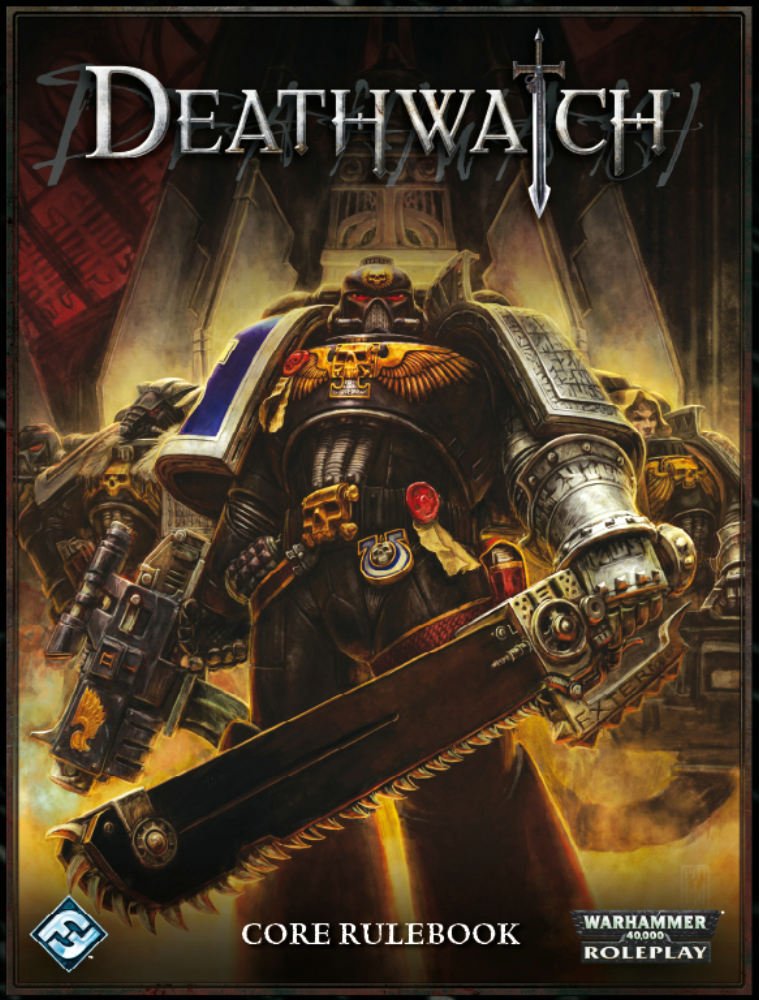I started to feel that I didn’t know roleplaying games well enough so I came up with the plan to read a roleplaying game corebook for every year they have been published. Selection criteria is whatever I find interesting.

Deathwatch is the third roleplaying game in Fantasy Flight Games’ Warhammer 40,000 series, the previous two being Dark Heresy and Rogue Trader. The series would continue with two more games, Black Crusade and Only War. The creative strategy is to look at the various corners of 40K’s fictional universe for setting elements that can be made into distinct roleplay experiences.
In the case of Deathwatch, the experience is perhaps the most iconic one: Space Marines, the superhuman armored knights symbolizing the whole setting. To make it possible for members of different Space Marine Chapters to work together, the game focuses on the titular Deathwatch, an elite organization composed of members from different Chapters. Thus an Ultramarine and a Space Wolf can fight together in the same Kill Team to exterminate the dread xenos.
It’s interesting to think of how the original requirements of the setting shape how it fits roleplaying. Because the setting was originally conceived for a miniatures wargame, it seeks to imbue the Space Marines, angry little plastic dudes sitting on your table, with as much dignity and portent as possible. To make your wargame feel meaningful, your soldiers are the mightiest warriors in the history of humanity, fearless and tireless in their relentless pursuit of the enemy!
In a roleplaying game, the relationship between the Space Marine and the player is different. Because the Space Marines are inhumanly brave, strong, dedicated and incorruptible, it’s hard to discern much in the way of internal play. What remains is the power fantasy: You’re an almost invulnerable space warrior, killing aliens with ease.
In Deathwatch, the satire of fascism inherent in 40K is turned up to eleven. The teeming millions living under the aegis of the Empire of Man suffer and toil as the entire industrial output of whole planets is directed at maintaining a war machine crusading against inhuman aliens. The Other is always a threat that must be neutralized any way possible. Obedience and ignorance are virtues, independent thought is a crime. The game game mostly plays these themes straight: This is just how it is.
In design, Deathwatch is extremely combat focused. The game features a GM backend structure where the characters (or Battle-Brothers, as the game often calls the all-male Space Marines) go on missions dictated by their military command structure. This way, the GM has a good grip on what’s happening in the game and where it’s directed.
The Deathwatch is a secret special forces organization with an independent command, focused on quick and fast missions using small teams. Perfect for a roleplaying group, in other words. Before each mission, the characters choose their battle prayers and use their requisition points to get extra gear. This way, they can customize their capabilities to the needs of each individual mission.
Another interesting design idea is Squad Mode. If their team spirit is sufficiently good, the characters can enter a special combat mode where their capabilities are heightened because of teamwork. They can also drop out of Squad Mode, lessening their capabilities. Some enemies are even designed to take advantage of this.